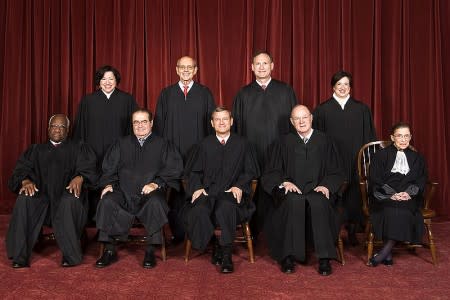Supreme Court rules against Florida in death penalty case
A divided Supreme Court said on Tuesday that Florida’s use of IQ tests as final evidence to determine death penalty eligibility is unconstitutional.
The case settles a capital punishment case that has been in the legal system since 1978.
In a 5-4 decision, a majority of Justices said in Hall v. Florida that a Florida law prohibiting anyone with an IQ of 70 or higher from being classified as mentally disabled, and thus making them eligible for the death penalty, violates standard medical practices.
Link: Read The Decision
“As interpreted by the Florida Supreme Court, however, Florida’s rule disregards established medical practice in two interrelated ways: It takes an IQ score as final and conclusive evidence of a defendant’s intellectual capacity, when experts would consider other evidence; and it relies on a purportedly scientific measurement of a defendant’s abilities, while refusing to recognize that measurement’s inherent imprecision,” Justice Anthony Kennedy said, writing for the majority.
“The death penalty is the gravest sentence our society may impose. Persons facing that most severe sanction must have a fair opportunity to show that the Constitution prohibits their execution,” Kennedy concluded. “Florida’s law contravenes our Nation’s commitment to dignity and its duty to teach human decency as the mark of a civilized world. The States are laboratories for experimentation, but those experiments may not deny the basic dignity the Constitution protects.”
The Hall case arose from the 1978 murder of Karol Hurst, who was 21 years old and seven months pregnant, by Freddie L. Hall. Hall was convicted and sentenced to death in Florida.
A trial judge found Hall to be mentally handicapped, and in 1999, the Florida Supreme Court ruled “there is no doubt that the defendant has serious mental difficulties, is probably somewhat retarded, and certainly has learning difficulties and a speech impediment.”
The Hall case is directly related to a case from 2002, Atkins v. Virginia, when the Supreme Court said it is unconstitutional under the Eighth Amendment to execute individuals who are determined to be mentally disabled.
After the Supreme Court’s Atkins decision, Hall’s attorneys challenged his death sentence. In his Supreme Court appeal, Hall’s attorneys said two dissenting judges in 1999 said testimony reflected that Hall had an estimated IQ of 60. Florida law prohibits anyone with an IQ of 70 or higher from being classified as mentally disabled.
But when Hall’s attorneys first filed an appeal after the Atkins decision, Hall was given new IQ tests, and his scores fell between 71 and 80. In a subsequent appeal, Hall’s attorneys claimed testing showed Hall’s IQ range between 67 and 75.
“Every state legislature, save one, to have considered the issue after Atkins and whose law has been interpreted by its courts has taken a position contrary to Florida’s,” Kennedy said.
“The States play a critical role in advancing the protections of Atkins and providing this Court with an understanding of how intellectual disability should be measured and assessed, but Atkins did not give them unfettered discretion to define the full scope of the constitutional protection,” he added.
Justice Samuel Alito wrote the dissenting opinion, in which was joined by Chief Justice John Roberts, and Justices Antonin Scalia and Clarence Thomas.
Specifically, Alito said the Court’s majority ruling in the Hall case muddles the Atkins decision.
“The Court held [in Atkins] that the Eighth Amendment prohibits a death sentence for defendants who are intellectually disabled but does not mandate the use of a single method for identifying such defendants. Today, the Court overrules the latter holding based largely on the positions adopted by private professional associations. In taking this step, the Court sharply departs from the framework prescribed in prior Eighth Amendment cases and adopts a uniform national rule that is both conceptually unsound and likely to result in confusion,” he said.
Recent Stories On Constitution Daily
Supreme Court decisions due on two Obama-related cases
Overlooked Supreme Court case could impact public unions
It was 227 years ago today the Constitutional Convention began


